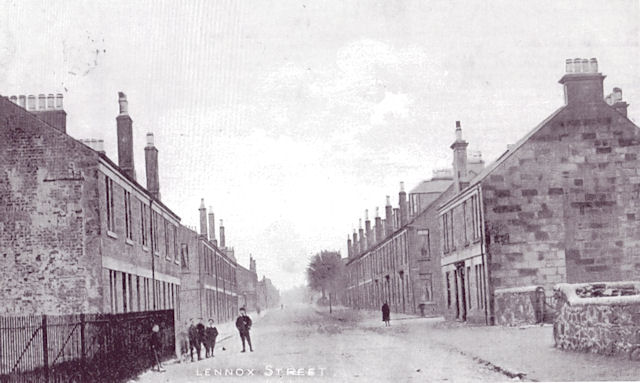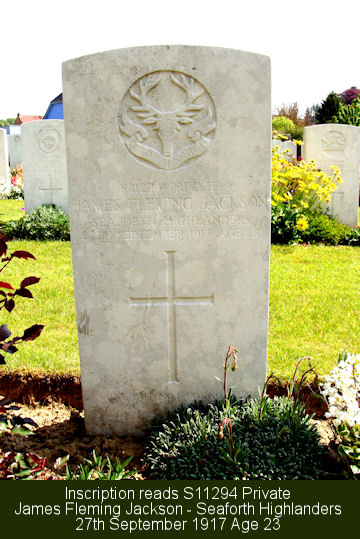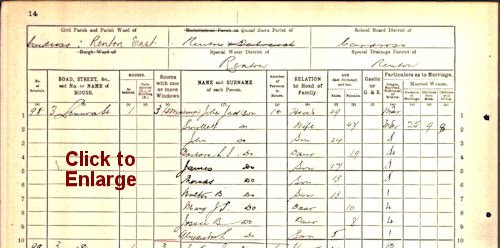Wembley Wizard’s Brothers were World War 1 Casualties
 One of Scottish football’s greatest heroes, Alex Jackson, who was not only one of the Wembley Wizards in Scotland’s 5-1 victory over England in 1928 but had the distinction of scoring a hat-trick in that game, had two older brothers who were casualties of WW1. One, James Jackson, was killed in September 1917, while another, Tom, was wounded a few months later in December 1917.
One of Scottish football’s greatest heroes, Alex Jackson, who was not only one of the Wembley Wizards in Scotland’s 5-1 victory over England in 1928 but had the distinction of scoring a hat-trick in that game, had two older brothers who were casualties of WW1. One, James Jackson, was killed in September 1917, while another, Tom, was wounded a few months later in December 1917.
Their parents, Mr John and Mrs Smollett Jackson didn’t have their troubles to seek when it came to their sons serving their country, because Alex himself was to die in a road accident in Egypt in 1946 while serving as a regular in the Army.
Mr and Mrs Jackson were not native Rentonians having been born in Kirkcaldy and Edinburgh respectively and had moved around Scotland living at different times in Edinburgh, Aberdeen, Leith, Aberdeen again, and Glasgow before arriving in Renton about 1900. Mr Jackson is variously described as a tin box maker or tinsmith and he worked in either Dalquhurn or Cordale Works.
As the Census Return for 1911 shows, Mr and Mrs Jackson had a large family of 4 daughters and 5 sons. The Census omits one daughter, Wilhelmina, who was married in 1909 and was therefore not living at 3 Lennox Street Renton when the Census was taken. The children in age order were:
- John (the eldest child)
- Wilhelmina (the eldest daughter)
- Barbara
- James
- Thomas
- Walter
- Mary
- Jessie
- Alexander (Mary, Jessie and Alexander were born in Renton.)
So in 1911 there were 10 people living in the Lennox Street house and until 1909 when Wilhelmina got married, there would have been 11.

Naturally enough, with such a large family, there are still a number of people living in the area who have John and Smollett Jackson as grandparents or great grandparents and have James, Tom and Alex as great-uncles. We have to thank two of them, Elizabeth Wynne and Iain Gillies for much of the material on which this account was based.
The third son, Tom Jackson, was the first to join the colours; he enlisted on 28th August 1914 aged about 19. At that time he was working as a grocer for the Vale of Leven Co-operative Society. Perhaps he got carried along on the great surge of patriotic enthusiasm for the war, perhaps the Army seemed more glamorous than being a grocer. In any event Tom became a Gunner in the Royal Field Artillery and by December 1917 he had been promoted to Bombardier. He was wounded in the leg by shrapnel in December 1917 just 3 months after James’s death and spent some time in hospital.
The second oldest son, James Jackson, joined the colours about a year after his younger brother Tom, in 1915 when he was aged 21. James, who had been born in Leith, was working in a shipyard in Dumbarton as an iron-driller when war broke out (the same job he had when the 1911 Census was taken). That was a reserved occupation, even after conscription was introduced in 1916, which exempted him from serving, but like many others in a similar situation he felt it his duty to join up.
He became a Private in the 8th Battalion of the Seaforth Highlanders (Serial Number S/11294). The 8th were one of the battalions of Kitchener’s New Army and were formed at Fort George in 1914, not going to France and the western front until July 1915. James Jackson was doing his basic training in 1915 and didn’t join his battalion in France until 1916. He probably took part in the later stages of the Battle of the Somme and would have seen action in the Arras Offensive in 1917. Ironically, it was well after that had finished that was killed in what is euphemistically called a “quiet period” in the Arras sector, on 27th September 1917, aged 23.
 James Jackson is buried in St Nicolas British Cemetery at Arras. There is also a memorial to him in Millburn Cemetery, Renton.
James Jackson is buried in St Nicolas British Cemetery at Arras. There is also a memorial to him in Millburn Cemetery, Renton.
It was only a few months after James’s death that Mr and Mrs Jackson learned that the other son that they had at the front, Tom, had been wounded in December 1917. He survived the war.
Alex Jackson was, of course, too young to serve in WW1 being the fifth son and youngest member of the family. After the War, people began as best they could to resume normal life, although the losses of the War dominated most aspects of life in Renton and the Vale, as elsewhere. Professional football had been allowed to continue in a much reduced form during the war, principally because football matches were seen in 1914-16 as an ideal forum for recruitment to the forces.
A full program in the senior leagues steadily resumed in 1919 and clubs were signing up good players. Alex’s older brother Walter proved to be a very handy footballer and he was making his way as a professional footballer long before Alex moved from Renton Victoria to Dumbarton in 1922.
Walter and Alex even went over together to the States to play for a short time for Bethlehem Steel. Alex’s stellar career which ended in injustice and a potential less than fully realised, was well under way (it is outlined in the Famous Vale of Leven Folk section of the website). Link >
Its peak was of course at Wembley in 1928 but a few years later he was out of British top-class football and more or less out of sight as far as the public was concerned. However, when the Second World War broke out Alex Jackson joined the British Army. Either at the outset or later he became a regular soldier and he began to climb the ladder of promotion, becoming an officer – one of the very few people with a working-class background from Renton or the Vale who have done so – attaining the rank of Major, so Army life must have suited him very well and he must have been good at his job. He had also got married and had two children.
1946 found Major Alex Jackson with the British Army in Egypt, holding the position as a welfare officer in the Suez Canal Zone. He had survived the war and was presumably doing a responsible job for which he would have been well suited. Life would have been good after the war and the years of strife which had characterised his last few years in football in the 1930s. Then fate intervened. He was driving an Army 3-ton truck along a slippery canal road when it overturned. Alex Jackson was badly injured and taken to hospital in Cairo, but died there the next day, 15th November 1946, aged just 41.
Mr and Mrs Jackson had lost another son who was “serving the colours”.



